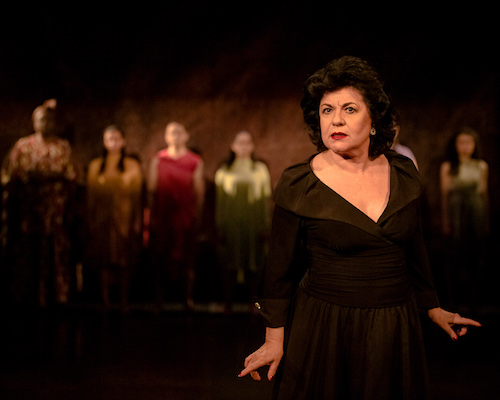
“Inspired by the women of Gabriel Garcia Marquez’s 100 Years of Solitude,” Beatriz Pisano’s The Solitudes (presented by Aluna Theatre in association with Nightwood Theatre at Harbourfront Centre) is about being a woman, being “The Other” — an immigrant, a descendant of immigrants, or an othered Indigenous person on stolen land — taking back spaces, and taking up space.
The 90-minute piece features the individual stories of each woman on stage, wrapping them together with interconnected themes and messages. It’s a challenging, cathartic experience that demands that you listen carefully and let these stories in.
Eight tree stumps ring what looks like a fire pit in the middle of the stage, which really contains a soft centre and buried secrets. This gathering place brims with invitation for storytelling. Presided over by a kind of ur-Matriarch, the three-level structure at the back of the stage is covered by a scrim, and highlighted by abstract projections by Trevor Schwellnus that add visual interest. The projections consistently return to a series of undulating, blood-red shifting shapes, emphasizing the tales’ themes of blood (menstrual, life-giving) and bloodline. These bloodlines provide genetic memory, and generational trauma, but also a sense of generational resilience.
The main action is at the front, but occasionally the actresses inhabit the space behind the scrim to present scenes of a more fable-like story, almost like each actress is preserved in an individual jewel box.
As introduction, each woman tells her or her family’s origin or immigration story. Their roots are from all over: Italy, Venezuela, Colombia, Mexico, Ghana, Lebanon, Poland, pre-colonized Turtle Island. They speak of generational traumas passed down, from survival of Auschwitz to survival of residential schools, from ancestors who were forced onto slave ships to ancestors who were permanently in a middle space between identities. Other traumas and abuses are personal and present.
Overall, the show feels smooth in its transitions and connections between pieces, slipping in and out of discussions of rigid, patriarchal institutions and expectations of perfection and servility. Each woman speaks passionately and with verve, and when movement is called for (Victoria Mata) they work as a well-oiled unit.
Standout moments include Rhoma Spencer telling us how to conjure love potions while dreaming of exhuming her ancestors’ bones from the ocean depths of a slave ship burial, and Michelle Polak’s fourth wall and tension-breaking TED talk on the damages incurred from trying to play every demanded archetype. Brefny Caribou schools us on the ugly side of “niceness,” and Rosalba Martinni tells a satisfying story of a mother winning the right for her girls to wear slacks in Catholic school. Sofia Rodriguez’s rapid transitions in her comparison of swearing in Spanish vs. English, with Spanish winning handily, are a treat.
In parts, The Solitudes feels a little like reading your Facebook feed, if you have social justice-inclined friends. There is abundant outrage, issues, and feelings of helplessness. But there’s also hope, survival, and connection in that knowledge of what it’s like to feel helpless.
What prevents the play from being a simple outrage spiral is its focus on contradictions. These contradictions speak to the complexity of the issues being discussed, and the nuance of the social justice framework, instead of forcing everyone into one definition of progressiveness and justice. To create change, Martinni says, “Sometimes you just have to get angry.” Later, however, she acknowledges the terrible repercussions of letting anger consume you, stating, powerfully, “anger will not be my epitaph.”
Spencer recognizes that, though individuals descended from diaspora have many things in common, there is a lack of a monolithic diasporic experience — meaning that you may not be understood by your country of residence, your people’s country of origin, or your fellow refugees.
These two women have the play’s main conflict, and an extended argument between them over one particular cultural practice effectively demonstrates that “progressive” for one can feel oppressive for another. Progressiveness is not a linear concept; instead, it often professes goals that may become mutually exclusive. Other women acknowledge that even the oppressed can have privilege that allows them to oppress others.
The Solitudes has a lot of wonderful content. Sometimes that makes it feel a little overstuffed — better than being underdeveloped, for sure, but it can get overwhelming. Not all connections work, and sometimes concepts simplify when all the women are speaking together. The least defined “character” is given the final monologue, making it feel less cathartic, and because of this, the ending feels a little abrupt for all the buildup. But messiness, as the show claims, is part of life, and the goal. Perfection is dismissed — growth, instead, is encouraged.
Details:
- The Solitudes plays at Harbourfront Centre (231 Queens Quay W) until January 18, 2020.
- Shows run Tuesday-Saturday at 8:00PM, with Saturday 2:00PM matinees.
- Tickets are $15-24 and can be purchased online, in person at the Theatre Box Office, or by calling 416-973-4000.
- The play contains stage haze, swearing, and partial nudity.
Photo of Rosalba Martinni and Ensemble by Jeremy Mimnagh
